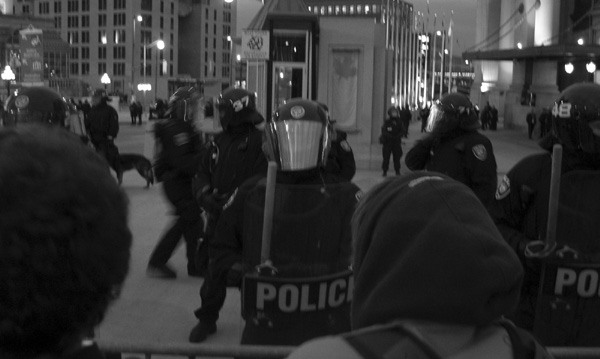The Federal Court ruling ordering his release can be found here.
CBC has this report on the order. It contains the facts, but as Brian O'Connor has pointed out, the headline "Harkat, accused of al-Qaeda links, freed for weekend", is misleading. House arrest is not freedom, and it is only comparatively 'free' when opposed to a weekend behind bars. Brian's excellent letter of complaint to the CBC calls on them to embrace their journalistic calling and recognize Harkat's situation as a story of manifest injustice.
For me, the CBC headline illustrates a problem that is at the heart of the public discussion about security certificates: The media either lacks the vocabulary to make sense of the issues, or, more likely, lacks the inclination to use an unofficial vocabulary in an effort to speak truth to power. House arrest isn't freedom - at least, not if we apply the same definitional standards to Mohamed Harkat's situation that we would to our own. 'Suspected of' does not mean 'guilty of', despite the government's best efforts to blur the line. The Kingston Immigration Holding Centre is most decidedly not a 'prison with three walls'. Individuals held at KIHC are not 'Individuals Subject to Security Certificates' - they are detainees, or, if we want to be accurate, prisoners being held indefinitely without trial. We are in the midst of a discursive conflict, and if the proponents of security certificates are allowed to define the language of the debate, security certificates will remain entrenched within the system.
Canadian media outlets need to remember that commitments to journalistic integrity and objectivity do not require that the state should be uncritically regarded as the source of neutral truth, particularly on matters related to human rights and justice. I am not suggesting that the coverage of the security certificate cases has consistently been flawed - there have been some solid, critical reports, and some journalists have diligently kept on top of the story. But coverage of the arrest of Mohamed Harkat has been weak, and the heavy-handed and politicized tactics used by the government have not been subjected to sufficient scrutiny. Coverage of C-3 has been much, much worse. The definitive (and obvious, and easily-researched) story that links the C-3 legislative process to the Charkaoui ruling and critiques both in light of the objections raised by human rights and legal associations has yet to be written. This is particularly bizarre given the furore over the Afghan detainee transfer scandal this week; for some reason, the mainstream media has been happy to criticize the government for politicking around the who-knew-what-and-when of that issue, but unwilling to address C-3 in a similar fashion, despite the fact that it effectively enshrines the possibility of return-to-torture in Canadian immigration law.
See also this Vancouver Sun article for a brief outline of some of the arguments made by the government regarding the decision to arrest and detain Mohamed Harkat. The government's position remains rooted in the assertion that Mr. Harkat is a sleeper agent for al Qaeda. The construction of threat in this case is biopolitical; that is, the government has inscribed a notion of permanent dangerousness into the physical being of Mohamed Harkat. This, they argue, justifies (indeed, demands) the most intrusive forms of surveillance and control, both of his life and the personal, intimate lives of his family, since any slip up could allow Mr. Harkat to - well, it's not clear what they think an unsupervised Mohamed Harkat might do. In a saner and more compassionate world, Stockwell Day's continued assertions that Harkat represents the perpetual embodiment of the terrorist threat would be dismissed by an overwhelming majority of Canadians as a ludicrous, politically expedient fantasy.
More to come, later.
Also, the C-3 Security Certificate legislation was discussed in the House of Commons yesterday, with further debate deferred until Monday. See here for the official Edited Hansard. The tone of the discourse has not changed since the last time C-3 was discussed in Parliament: The NDP are making excellent, well-reasoned submissions that highlight both the human rights flaws and lack of increased security for Canada associated with the legislation, and they are not supporting it; the Liberals, who are implicated in the history of the detention of the Secret Trial Five, are quibbling about certain points of C-3, but are going to support it (it takes tremendous courage and conviction for Liberal MPs to speak out against C-3 right now. I am still hoping that my own MP, Carolyn Bennett, will rise to the occasion); The Bloc Quebecois are making many critical statements about C-3, but have somehow been convinced by the government and security services that the IRPA security certificate mechanism is necessary to protect Canadians, and that no viable alternative exists; and the Conservative minority government is sticking to its talking points - arguing that the Secret Trial Five represent threats to Canada (a position that is less tenable as time goes by), insisting that there is an urgent and pressing need to pass C-3, and disingenuously sticking to the position that since security certificates are immigration mechanisms and not criminal justice mechanisms, all comparisons between the two systems are flawed.
More to come on this as well.
- Mike

No comments:
Post a Comment